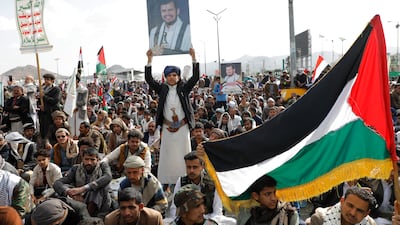Live updates: Follow the latest news on Israel-Gaza
UK diplomats are scrambling to end Houthi attacks on commercial vessels in the Red Sea as the country’s military draws up plans for strikes against the militant group.
The Iran-backed Houthis continued their attacks on shipping at the weekend, prompting clashes with the US Navy.
British diplomats are speaking to both the Houthis, who control the north of Yemen, and the country’s UN-backed government, which rules the south, a London-based diplomatic source told The National.
The militant group has sought to open another front against Israel amid its war on Gaza and has been attacking vessels in the Red Sea since November.
Foreign Secretary David Cameron spoke to his Omani counterpart Sayyid Badr Al Busaidi as well as Iranian Foreign Minister Hossein Amirabdollahian in recent days in an attempt to pressure Tehran to exert influence over its proxy.
Iran’s Foreign Ministry spokesman denied Tehran's role in the hostilities on Monday and accused the UK and US of threatening the Red Sea’s security, according to Iran International.
Oman has served as a mediator for the Houthis in the past, and most recently in November when the group’s attacks on the Red Sea began.
US Secretary of State Antony Blinken and Mr Cameron spoke on Tuesday with Mr Amirabdollahian and Mr Al Busaidi agreeing to "hold the Houthis accountable for these unlawful seizures and attacks".
The UK was also seeking avenues through Arab countries, which do not want to see an escalation in the region, the source said.
It comes as the UK military has set out plans to strike the Houthis should the attacks in the Red Sea continue.
Despite these efforts, the Houthis had left the UK and the US without “much options or choices”, according to former Yemeni diplomat Mustapha Numan.
The Houthis view themselves as having engaging in resistance against Israel and attacks by western powers will only validate their position.
“The Houthis want the [US and UK] to get involved in the conflict, it will make them look like real champions because they are in a war with the West,” Mr Numan told The National.
The group had become “more audacious and confrontational” in its attacks.
“They want to show that they are serious,” he said.
This had left the UK and US “stuck in quite an odd formula”, said Farea Al Muslimi, research fellow at international affairs think tank Chatham House, told The National.
“They don’t want to escalate in the region, but they don’t want Houthis to get away with it,” he added.
Another potential avenue for leverage could be Saudi Arabia, which has been engaged in peace talks with the Houthis since last year. Riyadh is unlikely to want to compromise its peace plan as it seeks an exit from the seven-year war in Yemen.
Arab countries – including Oman – would not want to be seen pressuring the Houthis while Israel’s war on Gaza is still raging.
“Arab countries have their hands tied, they cannot stop the Houthi attacks in the Red Sea even if they are haunted by them,” Mr Al Muslimi said.
“They cannot be part of a military coalition on the Red Sea while doing nothing on Gaza.
“The Houthis are the only ones doing anything on Gaza. They have tied everyone in a really awkward position.”
Others have suggested restoring the UN-backed government's control of the Hodeidah port as a form of pressure on the Houthis. It was handed over to the Houthis after the Stockholm Agreement in 2018.
“If there is going to be [US and British] diplomatic pressure on the Houthis, it should be done through the legitimate government,” said Mohammed Al Qubaty, a former Yemeni cabinet minister and acting chairman of the Southern Civil Democratic Rally.
“The UK and US should really come out to help and pressurise Houthis by giving leeway to the government in the south to respond against the other side.”
Pressure on Iran was a “reasonable approach”, he added, but there were no assurances that the Houthis would respond.
The UK and the US risk being drawn into Yemen’s unresolved war.
Yemen’s Southern Transitional Council, which seeks independence for the country’s south, is understood to be involved in the diplomatic developments around the Red Sea, according to a person familiar with the proceedings.


